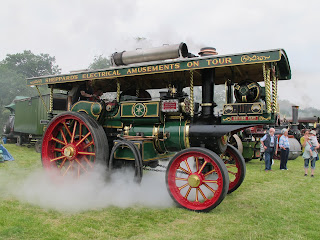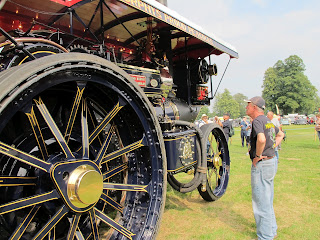'Little Mac', an engine with a particular memory for me (see last years Astle Park event
in this blog, 13th August 2011)
The late Fred Dibnah's roller
A showman's engine has its chimney extension stowed on the roof
Engines move towards the display ring, cylinder drain cocks open to blow any condensed steam out of the still cold cylinders where it might otherwise cause a hydraulic lock with
associated bent piston rods etc.
Stephenson's Link valve motion seems almost ubiquitous on traction engines. Note the safety valves mounted on the cylinder casting; traction engines don't have steam pipes from the boiler to the cylinders, instead the cylinders are surrounded by a chamber open to the boiler, so at boiler pressure, from which steam is admitted via the regulator valve to the cylinders. Therefore the safety valves on top of that casting are at the highest point above the water in the boiler at boiler pressure.
This Stanley Steam Car was having problems with its fuel supply. Under the bonnet is a 500psi boiler, fired by kerosene, the burner for which is initially heated by a petrol burning
jet to vapourise the kerosene .
jet to vapourise the kerosene .
Fred's Land Rover
Bikes galore! That's Bob Finlay in the striped T shirt, who was a Barton pilot
for most of the years that I was.
Steam driven milk float with a wooden-clad vertical boiler
Rear axle suspension and steering wheel of a showman's engine
Malcolm admires a lovely example of the type....
.....From South Shields, Malc's neck of the woods
Like many engines, this one is a two-cylinder compound. Steam is first used in the smaller, high pressure cylinder, then used agin to power the larger low pressure cylinder, then exhausted into the base of the chimney through the pipe visible here between the cylinders and chimney. There it is directed up the chimney to create a draught through the boiler tubes for the fire.
Several steam organs were belting out tunes around the rally field. Here's a look at the folded punched card 'programme' that drives one such instrument as it's fed through the card reader.
On the way home, we stopped at The Stag for a scoop or two. Malc and Ivan nearer the camera, Wigg behind. Our four bikes can be seen behind Wigg.
...And here's a similar picture but taken by Ivan, so I'm on it! Wigg's borrowed (from Ivan) Puch broke its throttle cable when we came to leave, but Malc had a tow rope. Being the most powerful bike of the four (a C90!), mine was chosen to tow Wigg and the Puch home; a task achieved with, surprisingly, no drama at all!
.
Rear axle suspension and steering wheel of a showman's engine
Malcolm admires a lovely example of the type....
.....From South Shields, Malc's neck of the woods
Like many engines, this one is a two-cylinder compound. Steam is first used in the smaller, high pressure cylinder, then used agin to power the larger low pressure cylinder, then exhausted into the base of the chimney through the pipe visible here between the cylinders and chimney. There it is directed up the chimney to create a draught through the boiler tubes for the fire.
Several steam organs were belting out tunes around the rally field. Here's a look at the folded punched card 'programme' that drives one such instrument as it's fed through the card reader.
On the way home, we stopped at The Stag for a scoop or two. Malc and Ivan nearer the camera, Wigg behind. Our four bikes can be seen behind Wigg.
...And here's a similar picture but taken by Ivan, so I'm on it! Wigg's borrowed (from Ivan) Puch broke its throttle cable when we came to leave, but Malc had a tow rope. Being the most powerful bike of the four (a C90!), mine was chosen to tow Wigg and the Puch home; a task achieved with, surprisingly, no drama at all!
.





















No comments:
Post a Comment